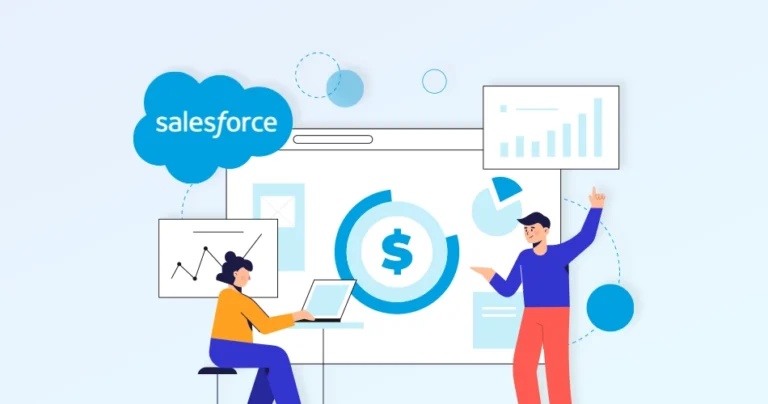Salesforce is an outstanding platform for your business. It offers powerful CRM tools to streamline sales, marketing, and customer service. But before diving in, you need to understand the implementation costs—licensing, customization, and integration. It can significantly impact your budget.
On average, implementing Salesforce into your system can cost anywhere from $75k to $150k. However, the actual figure would be lower or higher depending on the requirements and complexities of the project.
Through this blog, we’ll cover the Salesforce implementation costs, comparing implementation models and optimization strategies. Plus, you’ll know how our professional services can ensure the best results at affordable costs.
Average Salesforce Implementation Costs
Salesforce implementation costs vary widely based on business size, complexity, and customization needs. Here’s a general breakdown.
Small Business (Basic CRM Setup)
Average Cost: $15k to $50k
For startups and small businesses, a basic Salesforce implementation typically ranges from $15k to $50k. This includes core CRM setup, standard user licenses, and minimal customization. It’s ideal for managing leads, contacts, and basic sales pipelines.
Since most small teams don’t need complex workflows, costs remain low, with expenses primarily driven by user count and basic training.
However, opting for third-party integrations or additional Salesforce products (like Marketing Cloud) can push costs higher. A lean implementation ensures quick ROI while keeping budgets in check.
Mid-sized Business (Moderate Customization)
Average Cost: $50k to 150k
The Salesforce implementation cost for mid-sized companies with growing sales teams and more complex processes is between $50k and $150k. This tier includes deeper CRM customization, automation, and integration with ERP or marketing tools.
Data migration, user training, and minor app development (using Salesforce AppExchange solutions) often require adjustments to the Salesforce Data Model, which can add to expenses. Since scalability becomes a priority, investing in proper configuration now prevents costly rework later.
Enterprise Deployments (Advanced Customization & Scalability)
Average Cost: $150k to $500k & Beyond
For global corporations, Salesforce implementation is a strategic investment and often exceeds $500k. These projects involve multi-cloud ecosystems (Service Cloud, Marketing Cloud, CPQ) and deep integrations with SAP or Oracle. It may also include custom AI solutions (Einstein Analytics).
Enterprises also allocate significant resources to data governance, security compliance (like GDPR), and change management. Unlike smaller deployments, timelines stretch to 6-12 months, with ongoing costs for system maintenance and optimization.
Having Salesforce integration in your stead makes it worth the costs. The payoff? A unified, scalable platform that drives digital transformation. It goes far beyond basic CRM—across sales, service, and customer engagement.
Now, let’s look at the key offerings from Salesforce and how much they cost.
How Much Does Salesforce Implementation Cost?
Salesforce implementation can cost anywhere from $15k for small businesses to $500k or even beyond for enterprises. It depends on customization, integrations, user needs, and more. Key factors include:
Sales Cloud
Best for: CRM, lead management, and opportunity tracking.
Sales Cloud is Salesforce’s flagship CRM platform, and streamlines lead management, opportunity tracking, and sales forecasting. It automates repetitive tasks and provides AI-driven insights (via Einstein). It also integrates with email, calendars, and third-party tools so sales teams can close deals faster.
Key Features
- Lead & Opportunity Management: Track prospects through the sales pipeline.
- AI-driven Forecasting: Predict sales trends with Einstein AI.
- Contact & Account Management: Centralized customer data.
- Workflow Automation: Automate repetitive tasks like follow-ups.
Pricing: Sales Cloud pricing starts from $25 per user per month.
Service Cloud
Best for: Customer support, case management, helpdesk.
Service Cloud is designed for customer support and enhances case management, omnichannel engagement, and self-service portals. AI-powered features like chatbots and predictive analytics reduce resolution times and improve customer satisfaction.
Key Features
- Omnichannel Support: Manage calls, chats, emails, and social media in one place.
- Case Management: Resolve customer issues efficiently.
- AI-powered Chatbots: Automate responses with Einstein Bots.
- Self-service Portals: Enable customers to find solutions independently.
Pricing: Service cloud pricing starts from $25 per user per month.
Marketing Cloud
Best for: Email marketing, customer journeys, and ad campaigns.
Salesforce’s Marketing cloud is a personalized marketing automation suite. It enables email campaigns, customer journey mapping, and data-driven ad targeting. This platform unifies customer data across channels so marketers can deliver tailored experiences at scale.
Key Features
- Email & Campaign Automation: Design personalized marketing journeys.
- Customer Journey Analytics: Track engagement across channels.
- Social Media Integration: Manage ads and interactions from one dashboard.
- AI-driven Personalization: Deliver targeted content using predictive analytics.
Pricing: Marketing cloud pricing starts from $25 per user per month.
Commerce Cloud
Best for: eCommerce, online store management.
Commerce Cloud powers B2C and B2B eCommerce stores. It offers AI-driven product recommendations, unified inventory management, and seamless checkout experiences. This package connects sales, service, and marketing for a cohesive customer journey.
Key Features
- Unified B2B & B2C eCommerce: Manage online stores seamlessly.
- AI-powered Recommendations: Boost sales with personalized product suggestions.
- Order & Inventory Management: Sync sales across multiple channels.
- Mobile-optimized Shopping: Enhance buyer experiences on any device.
Pricing: Commerce cloud pricing starts from $25 per user per month.
Need help with Salesforce setup? Contact us for clear pricing.
Tableau
Best for: Data visualization and business intelligence.
Tableau is a leading data visualization tool and transforms raw data into interactive dashboards and real-time reports. Integrated with Salesforce, it helps businesses uncover trends, track KPIs, and make data-backed decisions.
Key Features
- Interactive Dashboards: Visualize data with drag-and-drop tools.
- AI-powered Insights: Uncover trends with natural language queries.
- Real-time Data Integration: Connect to multiple data sources.
- Collaborative Analytics: Share insights across teams securely.
Pricing: Tableau pricing starts from $75 per user per month.
Data Cloud
Best for: Unified customer data, AI-driven insights.
Formerly Customer Data Platform (CDP), Data Cloud unifies siloed customer data from multiple sources into a single, real-time profile. It enhances segmentation, personalization, and AI-driven insights across Salesforce applications.
Key Features
- Unified Customer Profiles: Consolidate data from multiple sources.
- Real-time Segmentation: Create dynamic customer segments.
- AI-driven Insights: Enhance decision-making with predictive analytics.
- Seamless Integration: Works with Salesforce & external platforms.
Pricing: Custom pricing per the implementation.
Einstein AI
Best for: AI & predictive analysis.
Einstein AI is Salesforce’s native AI layer. It embeds predictive analytics, automated workflows, and smart recommendations across all clouds. From lead scoring to service case routing, it enhances efficiency without requiring deep technical expertise.
Key Features
- Predictive Analytics: Forecast sales, churn, and customer behavior.
- Automated Workflows: Smart recommendations for next-best actions.
- Natural Language Processing (NLP): Analyze emails, chats, and cases.
- AI-powered Chatbots: Enhance customer service with intelligent bots.
Pricing: Custom pricing per the implementation.
Whether you’re a startup or a large corporation, understanding these cost drivers ensures a budget-friendly rollout. Choosing the right Salesforce Cloud depends on business goals, scalability needs, and budget.
Factors Impacting the Salesforce Implementation Costs
Salesforce implementation costs can vary widely depending on your business needs. Here are the top factors that influence pricing:
License Type & User Count
Salesforce offers tiered licensing (Essentials, Professional, Enterprise). More users = higher costs, but bulk discounts may apply. Choose the right edition—over-licensing wastes budget, while under-licensing limits functionality.
Customization Complexity
Basic CRM setups cost less, but advanced workflows, custom objects, and automation (e.g., Apex, Lightning) increase development time. Tailored solutions require expert consultants, raising implementation expenses. If your team plans to build custom UIs, using Lightning Web Components (LWC) in Salesforce can significantly enhance performance and reusability—but also adds to the development scope.
Data Migration & Integration
Moving legacy data or syncing with ERP/accounting tools requires cleansing, mapping, and testing. Complex integrations (APIs, middleware) add time and cost to, budget for unexpected data challenges.
Third-Party Apps & Add-Ons
AppExchange tools (marketing automation, analytics) enhance Salesforce but add subscription fees. Some require extra configuration, increasing implementation scope and cost.
Training & Change Management
User adoption drives ROI. Costs include admin training, documentation, and workshops. Neglecting this leads to low engagement, requiring costly re-training later.
Deployment Model
Cloud-based (Salesforce-hosted) is standard, but hybrid/private deployments add infrastructure costs. Implementation speed (phased vs. big-bang) also affects pricing.
We analyze each of these factors to come up with a personalized and affordable Salesforce implementation for your website.
BrainSpate Offers Affordable Salesforce Implementation
While Salesforce is one of the most advanced solutions you can have on your website, it doesn’t have to break the bank. At BrainSpate, we specialize in cost-effective Salesforce solutions tailored to your business needs without compromising quality.
Here’s how we ensure affordability.
- Right-sized Solutions: We analyze your workflows and recommend only the necessary Salesforce features, avoiding over-licensing and unnecessary customizations.
- Flexible Engagement Models: Choose from fixed-price, hourly, or hybrid pricing to align with your budget—ideal for startups, SMBs, and enterprises.
- Pre-built Templates & Accelerators: Leverage our library of reusable components to cut development time and costs by up to 30%.
- Offshore Development Advantage: Our global delivery model provides high-quality implementation at competitive rates, reducing labor costs significantly.
- Transparent Pricing: No hidden fees. We provide detailed quotes upfront, including licensing, customization, and training.
- Post-implementation Support: Avoid costly downtime with our affordable maintenance plans, including updates and user training.
Whether you need a basic CRM setup or a multi-cloud enterprise deployment, our Salesforce development company will be suitable.
Let’s Summarize
Salesforce implementation costs vary widely according to project requirements and complexity. The cost can go from around $15k for SMBs to over $500k for enterprise deployments.
But with careful planning and the right partner, the investment pays off in efficiency, scalability, and revenue growth. The key factors that drive the cost of Salesforce implementation are licensing, customizations, data migration, third-party integrations, change management, and more.
So, do you want help with implementing Salesforce CRM for your eStore? Then connect with us today!
FAQs on Salesforce Implementation Cost
Q1. How does company size affect implementation costs?
Larger organizations pay more due to complex workflows, multiple departments, and higher user counts. But SMBs benefit from simpler setups.
Q2. What’s cheaper: Sales Cloud or a custom-built CRM?
Sales Cloud’s scalability and updates often make it more cost-effective long-term despite higher initial costs vs. fragile in-house systems.
Q3. Is Salesforce implementation a one-time cost?
No, it includes ongoing expenses like license renewals (15-20% annually), support fees, and potential upgrades.
Q4. Can I implement Salesforce without technical expertise?
Technically, yes, but without Salesforce experience, you risk misconfigurations, poor adoption, and costly rework. That makes a partner advisable.

